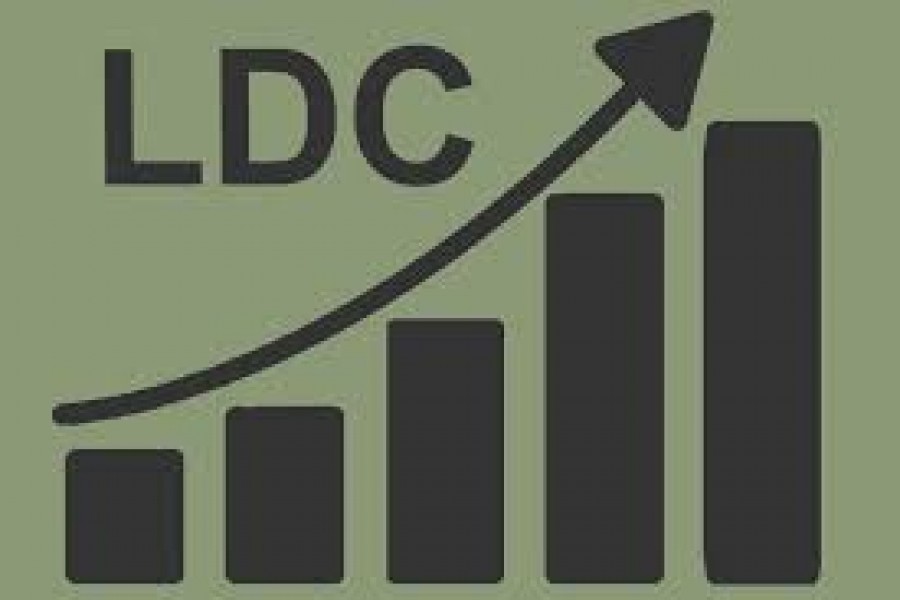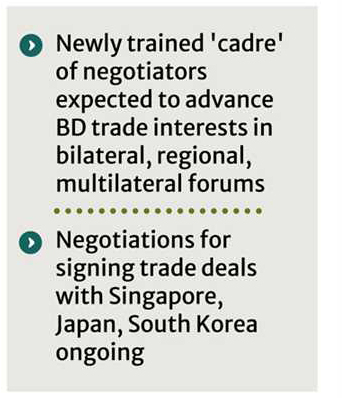
Published :
Updated :

Rearing a pool of skilled trade negotiators starts for sustaining export growth, diversifying markets and safeguarding Bangladesh's interests in an increasingly competitive global trading system.
The urgency and initial development were unveiled at a meet in Dhaka on Sunday, with main government negotiators in the just-held intense trade-and tariff negotiations with the United States presenting their views.
At the dialogue, titled 'Reflections & Way Forward: Building National Capabilities in Trade Negotiations', supported by the Commonwealth and the UNDP, the British envoy in Bangladesh assured that the United Kingdom will continue to accord duty-free market access even after its LDC graduation.
Speakers at the meet underscored the urgency of strengthening Bangladesh's trade-negotiation capacity as the country is poised to graduate from the least-developed countries (LDC) club next year.
The dialogue was organized by the commerce ministry with the support from the United Nations Development Programme (UNDP) under the Transformative Economic Policy Programme (TEPP), financed by the Foreign, Commonwealth and Development Office (FCDO) of the UK.

Speaking as the chief guest, Commerce Adviser of the interim government Sk. Bashir Uddin, who led the negotiations with the US administration from the front, stressed institutionalizing trade- negotiation capacity.
"As Bangladesh prepares to graduate from LDC status, the Trade Negotiation School will be vital in equipping our negotiators to secure the nation's interests in a complex global trade landscape," he said.
By strengthening policy frameworks and institutional support, the government aims to ensure that this pool evolves as a dynamic force - fully equipped to navigate the complexities of international trade and safeguard Bangladesh's economic interests in the years ahead, the businessman-turned government functionary told his audience.
Lutfey Siddiqi, Chief Adviser's envoy for International affairs, stressed that trade negotiations cannot be approached casually. "They demand institutional change, specialist expertise, authority, and continuity to succeed."
British High Commissioner in Bangladesh Sarah Cooke, speaking as special guest, reaffirmed UK's partnership with Bangladesh in all weathers. "The UK is proud to support Bangladesh to build a new generation of trade negotiators, and we remain firmly committed to supporting its journey toward a modern, inclusive economy."
The envoy assured Bangladesh that the country would continue to have duty-free and quota-free (DFQF) access to the UK market even after it graduates from the LDCs.
Chaired by Mahbubur Rahman, Commerce Secretary, the event also recognized members of the newly formed pool of trade negotiators with certificates. Drawing expertise from ministries, agencies, and academia, this cadre is expected to play a pivotal role in advancing Bangladesh's trade interests in bilateral, regional, and multilateral forums.
"We are working to form a pool of resources for negotiation for signing trade deals," said the commerce secretary.
He said the negotiations for signing trade deals with Singapore, Japan and South Korea are now ongoing. A team from Bangladesh is now in Japan for final negotiation for clinching the EPA with Japan, he told the function.
Both Bangladesh and Japan have been engaged in the final round of negotiations in Tokyo now. The final-round negotiation may be capped with the two governments signing the EPA this year.
Stefan Liller, resident Representative of UNDP Bangladesh, stressed that Bangladesh's graduation is "a call for an economic reset."
He said, "Bangladesh must craft a new generation of trade and investment strategies, negotiate favourable agreements, and defend its interests in global forums."
Central to this effort is a skilled and strategic team of trade negotiators. "The UNDP, together with the UK government, is proud to support this effort so that Bangladesh not only participates in global trade talks but does so with clarity, unity, and foresight."
Additional Secretary (Export Wing), commerce ministry, country economic adviser, UNDP Bangladesh, Owais Parray and chairman of RAPID Dr Mohammad Abdur Razzaque were also among many who shared their views at the event.
The UNDP, through the TEPP, is supporting the Bangladesh government to strengthen national trade capacities by developing a dedicated pool of trade negotiators, providing specialized capacity-building programmes and facilitating technical assistance.
The UN agency-supported initiative is designed not only to build individual skills but also to create institutional mechanisms that ensure knowledge retention and long-term sustainability of trade- negotiation capacity.
Currently, Bangladesh has been continuing negotiations with nearly a dozen countries for signing free-trade agreements (FTAs), Comprehensive Economic Partnership Agreement (CEPA) and Economic Partnership Agreement (EPA) to retain the preferential- trade benefit after the LDC graduation of the country in November 2026.
rezamumu@gmail.com


 For all latest news, follow The Financial Express Google News channel.
For all latest news, follow The Financial Express Google News channel.